Communities, particularly those with homeowners’ associations, and small businesses are frequently targeted by solicitors. These solicitors often represent various commercial, political, or religious entities. With neatly arranged homes, accessible driveways, and walkable sidewalks, neighborhoods and businesses become prime targets for door-to-door sales representatives. Small businesses often find themselves disrupted by unwanted solicitors during operational hours.
This guide will cover everything you need to know about No Soliciting Signs —their significance, legal implications, and effectiveness. By understanding their purpose, you can ensure that your home or business remains free from unnecessary interruptions, while also complying with local laws.

What does “No Soliciting” Sign Mean?
At its core, a No Soliciting sign conveys a clear and direct message: individuals seeking to sell goods or services, collect donations, or distribute information should not approach your door or enter your property. Whether you are a homeowner or a business owner, these signs serve as an essential tool in minimizing unwanted interactions.
The no soliciting sign meaning extends beyond simply refusing entry; it often carries legal weight, particularly in areas where trespassing laws enforce privacy. While these signs won’t guarantee complete protection from all solicitors, they act as a strong deterrent when backed by local regulations. In many areas, the presence of a No Soliciting sign makes it easier to take legal action against individuals who ignore the directive.
Who Are Solicitors and What Do They Sell?
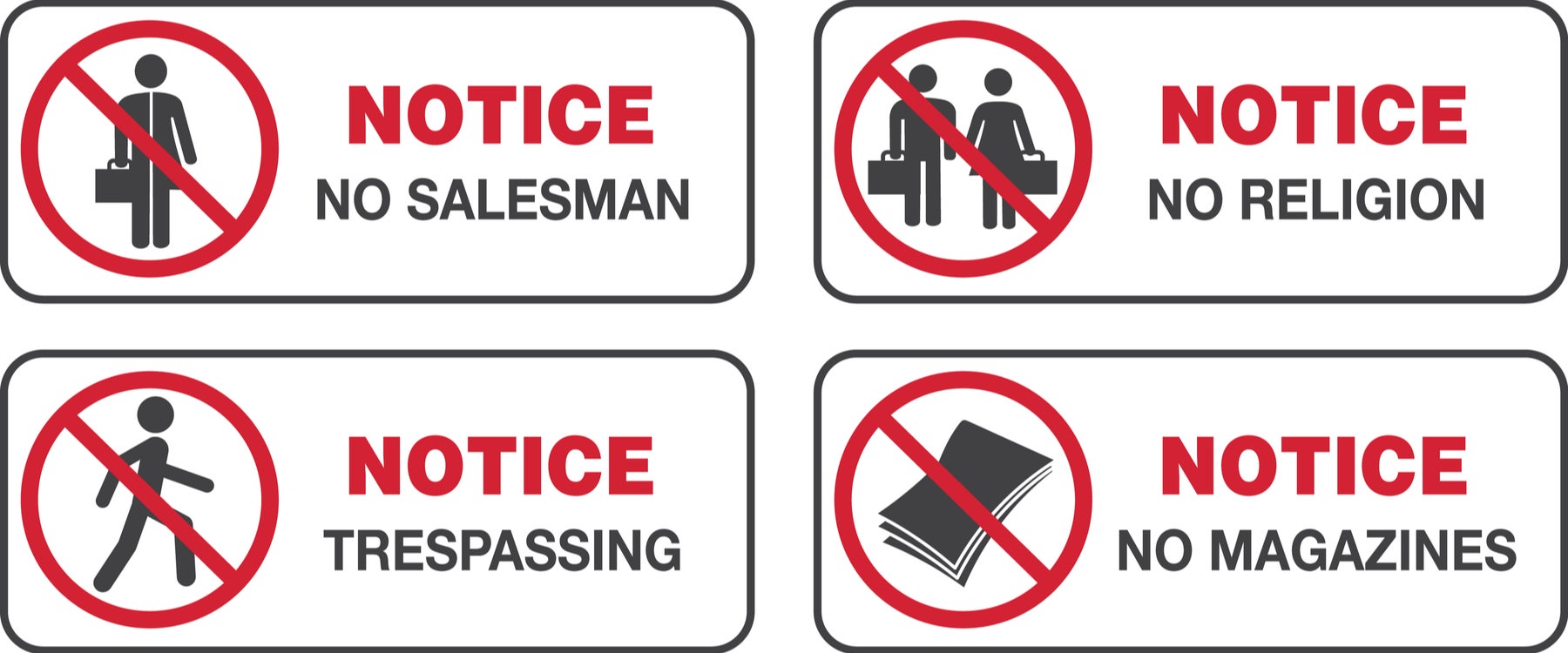
Solicitors can range from door-to-door salespeople to political campaigners, religious evangelists, and charity workers. They often approach properties to promote or sell a range of items such as cleaning products, home services, alarm systems, insurance policies, or financial services.
Distinguishing between solicitors and non-solicitors, however, can be a challenge. Religious groups or political canvassers may fall under constitutional protections due to the First Amendment, complicating efforts to prevent their activities. Despite this, No Soliciting signs for small businesses and homeowners still play a vital role in maintaining personal and professional boundaries.
Is Door-to-Door Soliciting Legal?
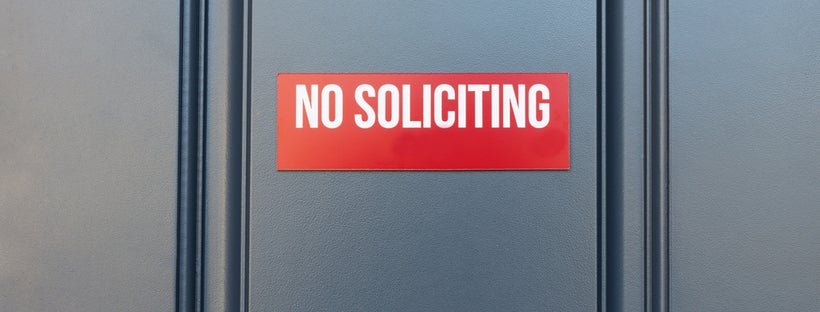
The legality of soliciting in the United States primarily hinges on the First Amendment, which protects free speech, including door-to-door canvassing for political or charitable purposes. While soliciting remains legal in many cases, homeowners and businesses have the right to restrict access to their properties through the use of No Soliciting signs.
Local municipalities often regulate soliciting by requiring permits, enforcing curfews, or establishing mandatory registration for solicitors. No Soliciting signs enhance a property owner’s legal standing, providing a basis to refuse entry and report persistent solicitors. Some states go further by enforcing penalties, such as fines or trespassing charges, against solicitors who ignore these signs.
If All This is Legal, How Do I Keep Solicitors Away from My Home or Business?
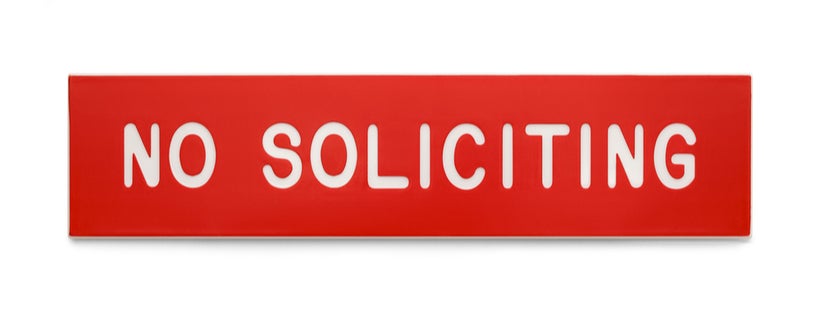
If you are wondering how to stop solicitors from knocking on your door or entering your business, here are several steps you can take:
- Post No Soliciting Signs: The simplest way to deter solicitors is by placing No Soliciting signs in highly visible locations such as gates, front doors, or windows. Make sure these signs are easy to read and located where solicitors are likely to see them upon approaching your property.
- Install No Trespassing Signs: Combining a No Soliciting sign with a No Trespassing Sign strengthens your legal argument. Trespassing laws apply to anyone entering private property without permission, giving you an extra layer of protection against solicitors who ignore your No Soliciting request.
- Check Local Laws: Ensure your signs adhere to local regulations. For example, some municipalities require specific wording for signs to be legally enforceable. Visit Municode to learn about your area’s laws regarding solicitation and trespassing.
These methods will help you create a legally enforceable boundary, ensuring that solicitors respect your privacy.
Do No Soliciting Signs Really Work?
You may wonder, Do No Soliciting signs work? The short answer is: yes, they do. When properly placed and designed, these signs significantly reduce the number of unwanted solicitors. However, effectiveness depends on several factors, including the visibility of the sign and local laws.
While most solicitors respect the directive, some may ignore the sign. In these cases, a polite reminder of your No Soliciting sign and your right to refuse entry can often resolve the issue. If the solicitor persists, you may be able to report them for trespassing, depending on your state’s laws. Persistent solicitors may face fines or even criminal charges, particularly if they refuse to leave when asked.
Legal Implications of No Soliciting Signs
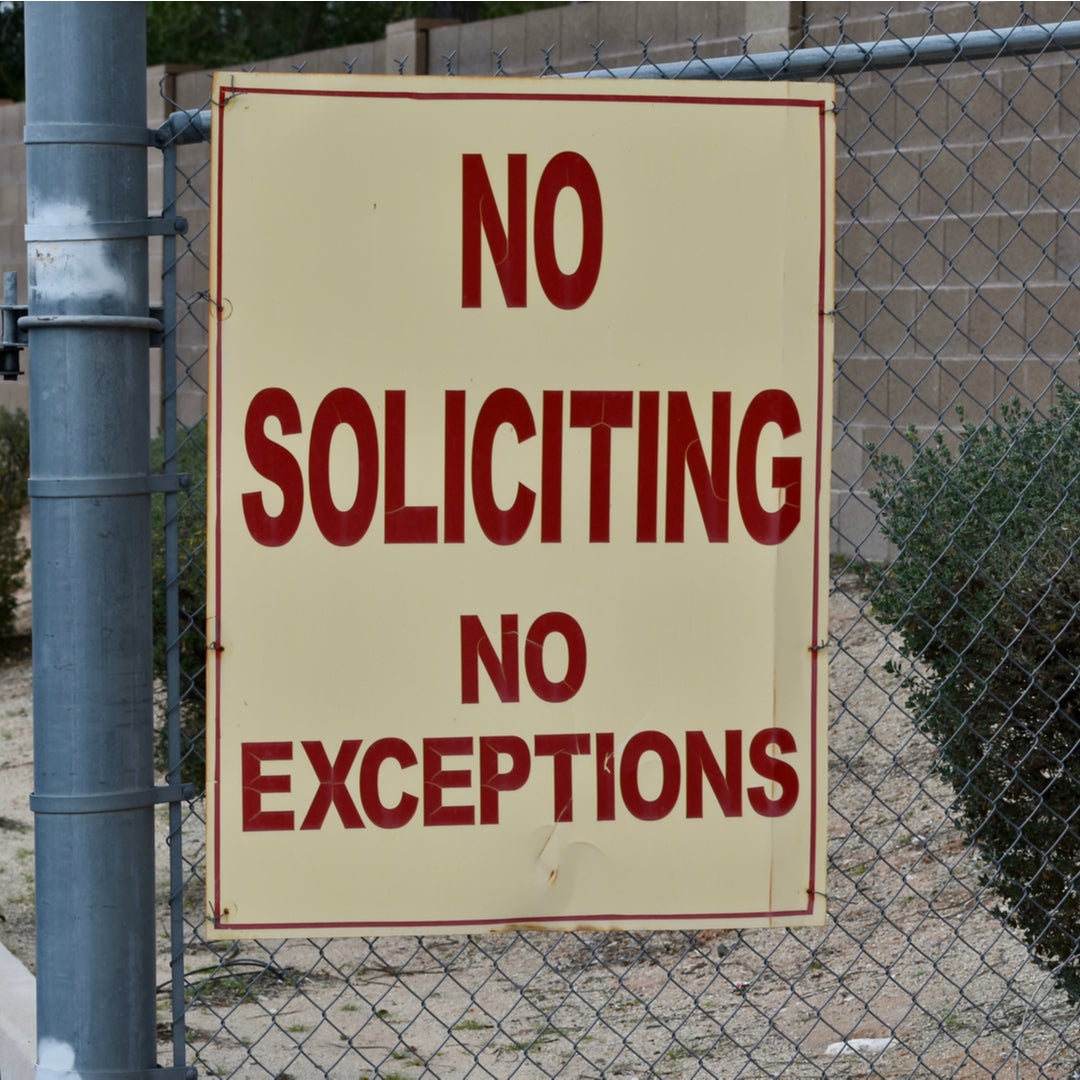
The effectiveness of a No Soliciting sign often depends on local ordinances and how well they are enforced. While most localities respect a homeowner’s right to post such signs, the laws surrounding soliciting and trespassing can be intricate. Federal courts have consistently upheld the right to free speech for political and charitable organizations, even when it involves door-to-door canvassing. However, local governments can implement reasonable regulations regarding the time, place, and manner of soliciting activities.
For instance, in some cases, towns have enacted strict curfews on soliciting or established permit requirements for commercial solicitors. Posting No Soliciting signs for small businesses is especially important because businesses often receive a higher volume of solicitors. Cohen Seglias, American Civil Liberties Union.
How To Ensure Your ‘No Soliciting Sign’ Is Effective
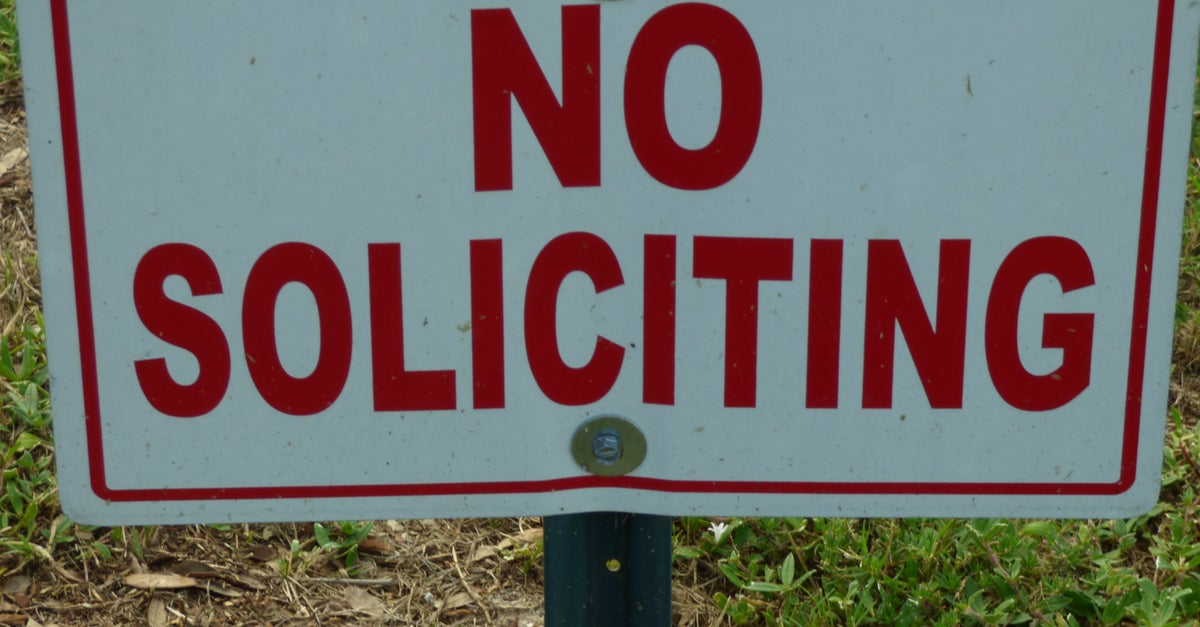
Most business owners would agree that unwanted solicitation can create daily stress and may even negatively impact employee morale & customer satisfaction. For private homeowners, there are some hours of the day when they just don’t want to be disturbed like during a favorite game or when they are taking a nap. So, here’s how you can ensure your No Soliciting sign actually works.
Make It Visible
Ensure that your No Soliciting sign is properly visible to everyone. Install it in a place that is accessible to passersby so they can easily see your message and respect your wishes.
Be Clear & Concise
Most state laws only require you to write No Soliciting on your sign for keeping canvassers away. Make sure you opt for a message that is clear and concise.
Customize Your Sign
You can also customize your sign to be certain it’s clearly visible. Choose colors that stand out like red on a white background to ensure your sign is readable even at night. You can also choose a size that fits your exact requirements with a custom sign.
No Soliciting Signs for Small Businesses
For small businesses, No Soliciting signs are essential to maintaining a professional environment free from distractions. These signs not only deter sales representatives but also enhance customer experience by limiting interruptions. Customizing the design of these signs can also align them with your brand while still delivering a clear message to solicitors.
In addition to No Soliciting signs, small businesses may benefit from installing compliance signs that adhere to local regulations. This ensures that your business is legally protected while maintaining a calm, distraction-free environment for customers and staff.
Protect Your Privacy with Custom Signs
Using No Soliciting signs is an effective, straightforward way to reduce unwelcome visits to your home or business. By complying with local laws and strategically placing your signs, you can protect your space and privacy from solicitors.
Whether you are a homeowner looking for peace or a business owner focused on providing a distraction-free environment, these signs are a valuable tool in managing who enters your property. Be sure to choose durable, highly visible materials such as rigid signs to meet your specific needs.
Final Thoughts
No Soliciting signs are really effective if you want to keep unwanted guests away from your private property or your business. You can take anyone who refuses to follow your custom sign to court, and they will be fined for trespassing. Make sure you get the right sign so you can enforce it with ease.
Resources:
What Does No Soliciting at a Business Mean?
https://smallbusiness.chron.com/doortodoor-sales-11354.html
Do the “No Soliciting Signs” Really Work? Is It Legal?
How to Get Rid of Door to Door Salespeople Once and For All!
https://www.signs.com/blog/how-to-get-rid-of-door-to-door-salespeople-once-and-for-all/
How To Enforce Your “No Soliciting” Sign








































 Posted in
Posted in 











